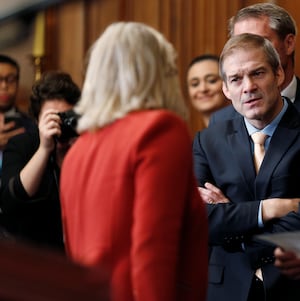Minutes before her removal from House leadership on Wednesday, Liz Cheney told her colleagues that the nation needed a Republican Party “based on truth,” warning that embracing Donald Trump would “drag us backward and make us complicit in his efforts to unravel our democracy.”
Hours later, after House Republicans swiftly stripped Cheney of her leadership position, they managed to prove her point at a hearing on Jan. 6.
Rep. Andrew Clyde (R-GA) said to call the insurrection an insurrection was a “bald-faced lie” because the people streaming into the Capitol looked like “a normal tourist visit.” Rep. Paul Gosar (R-AZ), who has ties to the organizers behind Jan. 6, said law enforcement was “harassing peaceful patriots.” And Rep. Ralph Norman (R-SC) theorized that it was impossible to know if it was actually Trump supporters who stormed the Capitol because no one had polled the rioters.
“It was Trump supporters who lost their lives that day,” added Rep. Jody Hice (R-GA), “not Trump supporters who were taking the lives of others.”
The embrace of a fabricated version of Jan. 6 was the natural progression following what they did that morning—booting Cheney from her position as the GOP conference chairwoman. And it was perhaps Cheney’s proclivity for telling the truth about Trump, the insurrection, and Republican lies about voter fraud that ultimately sealed her fate.
Just don’t tell that to Republican members. If you ask them, you’ll get an assortment of tortured explanations.
“It's just the style of leadership,” Rep. Tim Burchett (R-TN) told The Daily Beast on Tuesday.
“I felt she pushed too hard to spend more money in the first Trump budget,” Rep. Glenn Grothman (R-WI) said, referring to something that happened four years ago.
“Just became too much of a distraction,” Rep. Byron Donalds (R-FL) told reporters on Wednesday.
In interviews with more than 20 House Republicans this week, it’s clear that most GOP members had become uncomfortable with Cheney continuing to represent them in leadership. But their rationales were often far from coherent, and the real reason why so many wanted to take away Cheney’s megaphone—whether Republicans would like to admit it or even realize it—is that she undermined a key endeavor of the GOP: lying.
Every time Cheney defiantly said the 2020 election had not been stolen from Trump, she undercut Republican attempts to change laws making it harder to vote. Every time she laid the blame for Jan. 6 at Trump’s feet, Republicans became a little more uneasy. And every time she referenced “The Big Lie,” she inconveniently suggested that those refusing to acknowledge Joe Biden’s legitimate victory were, in fact, not telling the truth.
“The 2020 presidential election was not stolen. Anyone who claims it was is spreading THE BIG LIE, turning their back on the rule of law, and poisoning our democratic system,” Cheney tweeted on May 3, in what may have been the final straw.
On Wednesday afternoon, as House GOP leader Kevin McCarthy (R-CA) exited a meeting with Biden and other congressional leaders at the White House, he somehow claimed that he didn’t think anybody was “questioning the legitimacy of the presidential election.”
“That is all over with,” McCarthy said.
But it’s obviously not. And as The Daily Beast sought explanations from GOP members as to why Cheney had to go, Cheney’s resolute declarations about the election seemed to be at top of mind for many.
Rep. Barry Loudermilk (R-GA) told The Daily Beast that Cheney had thrown GOP lawmakers “under the bus” precisely because she called out those actively questioning the legitimacy of the presidential election.
“If we say we have questions about the 2020 election, then you're somehow enemy to democracy,” Loudermilk said.
Rep. Jim Jordan (R-OH) expressed a number of issues he had with Cheney even before the election, but he also seemed offended that Cheney would side with Democrats on issues like impeachment, the 2020 election winner, and Jan. 6.
“The problem is you can’t have a Republican conference chair who continually recites Democrat talking points,” Jordan said. “You can't have a Republican conference chair who takes positions that 90% of the party oppose.”
Rep. Elise Stefanik (R-NY), the overwhelming favorite to take Cheney’s position now that she’s been ousted, told The Daily Beast Wednesday morning that the GOP conference chair—charged with helping Republicans message—needed to “represent the whole team.”
“And I believe that she lost the faith of the members of the conference,” Stefanik said.
When The Daily Beast asked Stefanik if anything Cheney had said was actually inaccurate or should be controversial, Stefanik revealed her sense of subjective truth.
“What she’s saying is not representative of the viewpoints of 70-plus million Americans who voted for President Trump, or for the majority of our conference members,” Stefanik said. “It’s important that we focus on election security and election integrity moving forward, and that’s why you see state legislatures taking action.”
It’s that key Republican endeavor—to clamp down on voting—that may truly be the most Machiavellian reason for Cheney’s removal. As Republicans turn to state legislatures for new rules that would make it harder for people to vote, the last thing they need is a GOP leader calling out their own attempts to restrict voting as an unnecessary and naked power grab.
Republican lawmakers and operatives appear convinced that voter integrity issues will be a winner for the GOP headed into the critical 2022 elections. John McLaughlin, who served as a top pollster for Trump during the 2016 and 2020 races, told The Daily Beast on Wednesday that based on his data, he believes voting issues could “help defeat” Democratic Sens. Mark Kelly (D-AZ), Maggie Hassan (D-NH), Raphael Warnock (D-GA), and Catherine Cortez Masto (D-NV), all up for reelection next November.
McLaughlin called it a “fundamental issue” that motivates “Republicans and conservatives but wins big among all voters."
For months, the twice-impeached former president has also told allies on Capitol Hill and his advisers that “election integrity issues”—as they call them—have to be a core tenet and litmus test in upcoming GOP primaries, according to three people familiar with the matter. Earlier this year, Trump even went as far as to say that a candidate’s refusal to acknowledge that Biden legitimately won could factor into his decisions when it came time to pick more endorsements.
But it’s not just Trump and his allies who see these election issues as a major issue in the GOP. Cheney’s dwindling camp of defenders also saw how her speaking the truth about the 2020 election was a major reason for her removal.
“Liz didn’t agree with President Trump’s narrative and she was cancelled,” Rep. Ken Buck (R-CO) told reporters on Wednesday. The arch-conservative lawmaker warned that voters would remember in 2022 that Republicans “were unwilling to stand up to a narrative that the election was stolen.”
Rep. Adam Kinzinger (R-IL), one of Cheney’s staunchest defenders, also told reporters Wednesday morning that what was happening in the GOP conference was “terribly backwards.”
“On Day One, you know, when Kevin was spending five or eight minutes, you know, supporting Marjorie Taylor Greene, and then, you know, 12 seconds defending Liz at the end of it, it’s backwards,” Kinzinger said. “It just goes to show that this is all about maintaining power.”
Kinzinger added that nothing Cheney has said to date was “controversial, you know, in the truth world,” and he said that Republicans needed to gain power by being honest and engaging voters “like adults and not like the children that we’ve been lately.”
“The reality is, you can’t blame people that think the election was stolen, because that’s all they hear from their leaders,” Kinzinger said. “It’s leaders’ job to tell the truth even if that’s uncomfortable, and that’s not what we’re doing.”
A House GOP aide aligned with Cheney was even more emphatic Wednesday, telling The Daily Beast that this effort to strip Cheney of her position was about “Donald Trump and his lies. Full stop.”
“There’s not a single member that has claimed the things that Rep. Cheney has said are wrong, but she still was removed,” this aide said. “That says more about the state of the conference and its fealty to Trump’s ludicrous BS than it does about her.”
One senior GOP aide told The Daily Beast that, while demoting Cheney may help in Republican attempts to restrict voter access, it probably wasn’t the conscious thought of most members to remove her for that reason. Instead, this aide said, it was Republican uneasiness with talking about the insurrection.
“Many members don’t even disagree with her views on January 6th—they just don’t want to talk about it publicly,” this senior GOP aide said. “It doesn’t unify the conference or serve the party’s broder message to constantly insert the insurrection into the conversation. It’s the opposite of message discipline.”
Cheney’s continued insistence to point out Trump and the GOP’s lies did seem to finally cross a threshold for GOP leaders last week, when McCarthy and GOP Whip Steve Scalise (R-LA) finally said they’d had enough with her.
Three months ago, when Cheney faced the first campaign to remove her as conference chair, McCarthy was a key reason she kept the position. By a two-to-one margin, the conference voted to keep her in leadership following her vote to impeach Trump and her blistering criticism of his role in fomenting the Jan. 6 insurrection.
At the time, House Republicans were largely willing to accommodate Cheney’s views. But since that vote, the consensus among House GOP members changed, and now most agreed Cheney had become a problem, even if they refused to identify why that was the case.
Rep. Marjorie Taylor Greene (R-GA)—after first refusing to answer a question about when Cheney had become a problem for Republicans because the reporter was wearing a mask—then asked for the reporter to tell her why Cheney had become a problem.
“I’m asking you, you’ve reported on it,” Greene said.
Rep. Lauren Boebert (R-CO) answered that question by saying Cheney became a problem “when she voiced her own personal opinions as conference chair.”
And Rep. Thomas Massie (R-KY) refused to meaningfully answer, suggesting that it was a gotcha question.
“When did you stop beating your wife?” Massie replied.
—with reporting from Asawin Suebsaeng.



